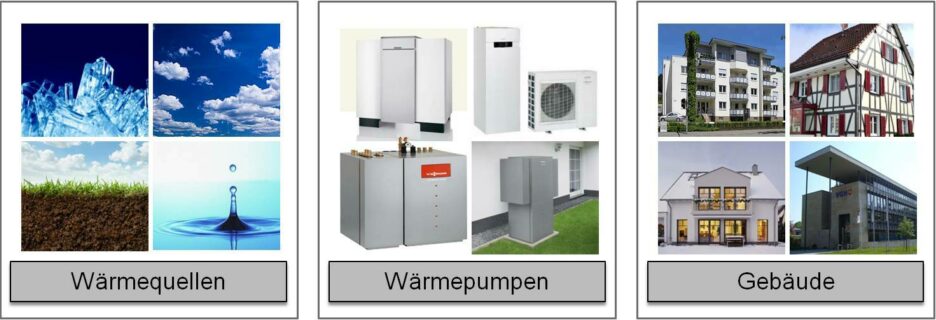future:heatpump
Back to project overviewProject description
future:heatpump_II - Extension and expansion of the WPSOURCE pre-dimensioning program
The future:heatpump_II research project serves to expand and optimize the "WPSOURCE" pre-check tool developed for the pre-dimensioning of low-temperature heat sources and heat exchangers for heat pumps as part of the future:heatpump research project. The program takes both renewable and conventional heat and electricity generators into account and combines them into sensible energy concepts with low primary energy consumption and CO2 emissions.
Developments in the area of energy requirements and the demand-driven energy supply of buildings show an increasing economic and ecological importance in connection with the use of renewable energy sources.
The optimized design of a heat pump, the selection of the corresponding energy source and the connection to the building are essential prerequisites for achieving energy-efficient and long-term economical operation.
The overarching aim of the future:heatpump research project is to develop a pre-check tool for selecting suitable heat sources based on a holistic, energetic and economic evaluation of the low-temperature heat sources and heat exchanger systems for heat pumps available on the market. In the area of residential buildings, systems for single and multi-family houses for heating buildings and domestic hot water are examined. In the case of non-residential buildings (office buildings), the system analysis is carried out for heating and cooling.
A total of seven work packages are to be carried out within this project. First of all, a comprehensive system and market research will be carried out to identify and present the most common heat exchanger systems available and implemented on the market. Subsequently, sample systems will be developed and defined by means of a system configuration. In an accompanying monitoring process, 6-10 different systems in operation are to be examined and documented using measurement technology. The project also includes the creation of simulations for various energy sources, special considerations in which the connection and the holistic concept between sources - building - system are to be considered. Finally, the evaluation includes technical and economic aspects as well as the general economic efficiency (capital, operating and energy costs).
As part of the low-level monitoring, systems for single and multi-family homes for heating buildings and domestic hot water are examined in the residential building sector. In the case of non-residential buildings (office buildings), a system analysis is carried out for heating and cooling. The monitoring will extend over two years, so that two heating and cooling periods can be used to evaluate performance and calculate parameters.
Presentation of the implemented building typologies
- Stiebel Eltron GmbH & Co. KG, Holzminden
- Viessmann Werke GmbH & Co KG, Allendorf (Eder)
- Uponor GmbH, Hassfurt Doppelacker GmbH, Petershagen
- Europoles GmbH & Co. KG, Neumarkt
- geoKOAX, Gräfelfing near Munich e-Tank, Fürstenwalde
- Federal Ministry for Economic Affairs and Energy (BMWi) FKZ:O3ET1273A
